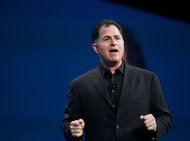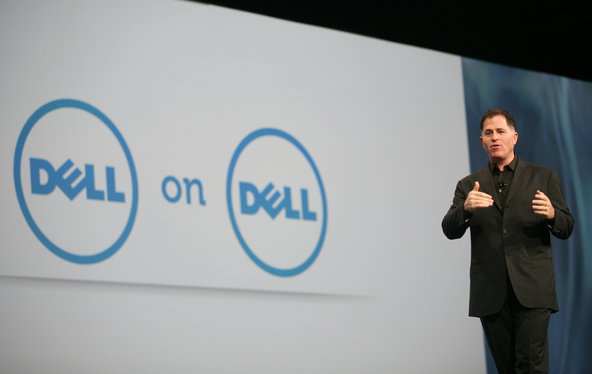 Kimihiro Hoshino/Agence France-Presse — Getty ImagesThe decision to take Dell private puts the company more firmly under the control of Michael S. Dell.
Kimihiro Hoshino/Agence France-Presse — Getty ImagesThe decision to take Dell private puts the company more firmly under the control of Michael S. Dell.
9:32 a.m. | Updated
Dell announced on Tuesday that it had agreed to go private in a $24.4 billion deal led by its founder and the investment firm Silver Lake, in the biggest leveraged buyout since the financial crisis.
Under the terms of the deal, the buyers’ consortium, which also includes Microsoft, will pay $13.65 a share in cash. That is roughly 25 percent above where Dell’s stock traded before word emerged of the negotiations of its sale.
Michael S. Dell will contribute his stake of roughly 14 percent toward the transaction, and will contribute additional cash through his private investment firm, MSD Capital. Silver Lake is expected to contribute about $1 billion in cash, while Microsoft will loan an additional $2 billion.
Dell’s board is said to have met on Monday night to vote on the deal. In its statement, the company said Mr. Dell recused himself from any discussions about a transaction and did not vote.
As a newly private company – now more firmly under the control of Mr. Dell – the computer maker will seek to revive itself after years of decline. The takeover represents Mr. Dell’s most drastic effort yet to turn around the company he founded in a college dormitory room in 1984 and expanded into one of the world’s biggest sellers of personal computers.
But the advent of new competition, first from other PC manufacturers and then smartphones and the iPad, severely eroded Dell’s business. Such is the concern about the company’s future that Microsoft agreed to lend some of its considerable financial muscle to shore up one of its most important business partners.
“I believe this transaction will open an exciting new chapter for Dell, our customers and team members,” Mr. Dell said in a statement. “Dell has made solid progress executing this strategy over the past four years, but we recognize that it will still take more time, investment and patience, and I believe our efforts will be better supported by partnering with Silver Lake in our shared vision.”
Still, analysts have expressed concern that even a move away from the unyielding scrutiny of the public markets will not let Mr. Dell accomplish what years of previous turnaround efforts have failed to achieve.
Nevertheless, the transaction represents a watershed moment for the private equity industry, reaching heights unseen over the past five years. It is the biggest leveraged buyout since the Blackstone Group‘s $26 billion takeover of Hilton Hotels in the summer of 2007, and it is supported by more than $15 billion of debt financing raised by no fewer than four banks.
“Michael Dell is a true visionary and one of the pre-eminent leaders of the global technology industry,” Egon Durban, a managing partner at Silver Lake, said in a statement. “Silver Lake is looking forward to partnering with him, the talented management team at Dell and the investor group to innovate, invest in long-term growth initiatives and accelerate the company’s transformation strategy to become an integrated and diversified global I.T. solutions provider.”
Mr. Dell first approached the board about taking the company private in August. That prompted the board to form a special committee, with JPMorgan Chase and the law firm Debevoise Plimpton as advisers. It was charged with considering alternatives to a management buyout, including other deals or borrowing money to pay out a special dividend.
To help ward off accusations of self-dealing by Mr. Dell, the special committee has hired an independent investment bank, Evercore Partners, specifically to oversee a 45-day “go shop” period in which the company will solicit other potential buyers.
“The special committee and its advisers conducted a disciplined and independent process intended to ensure the best outcome for shareholders,” Alex J. Mandl, the head of the Dell independent committee, said in a statement. “Importantly, the go-shop process provides a real opportunity to determine if there are alternatives superior to the present offer from Mr. Dell and Silver Lake.”
Dell itself was advised by Goldman Sachs and the law firm Hogan Lovells, while Mr. Dell retained Wachtell, Lipton, Rosen Katz as legal counsel. Silver Lake was advised by Bank of America Merrill Lynch, Barclays, Credit Suisse, RBC Capital Markets and the law firm Simpson Thacher Bartlett.
On Tuesday, Mr. Dell sent a memo to company employees about the deal. Here is a copy of the memo:
Today, we announced a definitive agreement for me and global technology investment firm Silver Lake to acquire Dell and take it private.
This transaction is an exciting new chapter for Dell, our team and our customers. We can immediately deliver value to stockholders, while continuing to execute our long-term growth strategy and focus on helping customers achieve their goals.
Together, we have built an incredible business that generates nearly $60 billion in annual revenue. We deliver enormous customer value through end-to-end solutions that are scalable, secure and easy to manage, and Enterprise Solutions and Services now account for 50 percent of our gross margins.
Dell’s transformation is well underway, but we recognize it will still take more time, investment and patience. I believe that we are better served with partners who will provide long-term support to help Dell innovate and accelerate the company’s transformation strategy. We’ll have the flexibility to continue organic and inorganic investment, and grow our business for the long term.
I am particularly pleased to be in partnership with Silver Lake, a world-class investment firm with an outstanding reputation and significant experience in the technology sector. They know all the technology business models, understand the value chain and have an extremely strong global network of contacts. I am also glad that Microsoft is part of the transaction, further building on a nearly 30-year relationship.
I am honored to continue serving as chairman and CEO, and I look forward to working with all of you, including our current senior leadership team, to accelerate our efforts. There is much more we can accomplish together. I am committed to this journey and I am grateful for your dedication and support. Please, stay focused on delivering results for our customers and our company.
There is still considerable work to be done, and undoubtedly both challenges and triumphs lie ahead, but as always, we are making the right decisions to position Dell, our team and our customers for long-term success.
Michael
Article source: http://dealbook.nytimes.com/2013/02/05/dell-sets-23-8-billion-deal-to-go-private/?partner=rss&emc=rss
